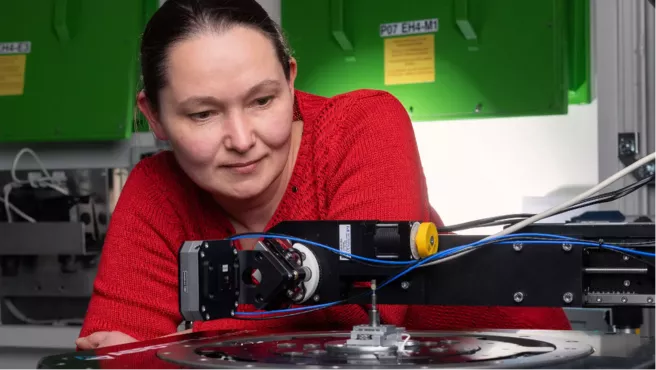Prof. Dr. Job Boekhoven
In his project SynLife, Job Boekhoven wants to create synthetic life. This is, however, not about sentient robots or other technological visions. The chemist is researching so-called active droplets. These tiny droplets made of insoluble molecules exhibit life-like behavior: they only form when external energy is supplied and can multiply by dividing with sufficient energy. NASA defines life as a self-sustaining system capable of Darwinian evolution. In order to fulfill these criteria, Job Boekhoven wants to develop molecules that form a kind of genetic material. They are intended to influence properties such as the lifespan of the droplets, are passed on when a droplet divides, and can, in new ways, mutate and lead to new properties. Such artificial evolution could not only help to provide insights into the origins of life, but also make Darwinian evolution usable as a tool for the design of new materials.
Job Boekhoven is Professor of Supramolecular Chemistry. His research on active droplets has already been awarded an ERC Starting Grant.
Prof. Dr. Karl Duderstadt
Cell division is an important mechanism in the human body to maintain it and at the same time to reproduce. In the cell nucleus, the DNA is coiled into nucleotides and further packaged into chromosomes. In order for the cell to divide, the DNA must first be unpacked before the DNA strands can be read and duplicated individually. As this step only works in one direction, one of the two strands is replicated continuously and the other strand is replicated discontinuously. So-called replisomes coordinate and carry out the entire process. So far, little is known about how the enzymes and proteins involved communicate with each other and coordinate the reading and duplication of the strands. In the ERC project "Recreating molecular memories: imaging the mechanics of chromosome assembly and the birth of cell identity", Prof. Karl Duderstadt is investigating the interactions within replisomes that ensure faithful chromosome duplication by imaging the dynamics of the process at the single-molecule level.
Karl Duderstadt is Professor of Experimental Biophysics at TUM and research group leader at the Max Planck Institute of Biochemistry.
Prof. Dr. Julia Herzen
High-resolution images, particularly from bright X-ray sources known as synchrotrons, provide valuable information about the shape and structure of both tissue and material samples. However, until now it has not been possible to determine the exact composition, distribution, and amount of individual substances in the samples at such a high resolution, although such images theoretically contain this information. The images are produced by a combination of different physical effects, and it has not been possible to separate these effects in the image data. In the DEPICT project, Prof. Julia Herzen aims to develop a physical model that will allow these effects to be precisely separated from each other, thus maximizing the information contained in the measured data. She plans to further develop X-ray imaging at the micrometer scale and to transform it from a method for the purely optical evaluation of images into a quantitative method that generates specific figures on the composition of materials. In the project, she will then use the method to investigate biomedical, materials and environmental science questions.
Julia Herzen is Professor of Biomedical Imaging and conducts research at the Munich Institute of Biomedical Engineering (MIBE) at TUM.
Original article:
Corporate Communications Center
- Paul Hellmich / Carolin Lerch / Julia Rinner
- presse@tum.de
- Teamwebsite
